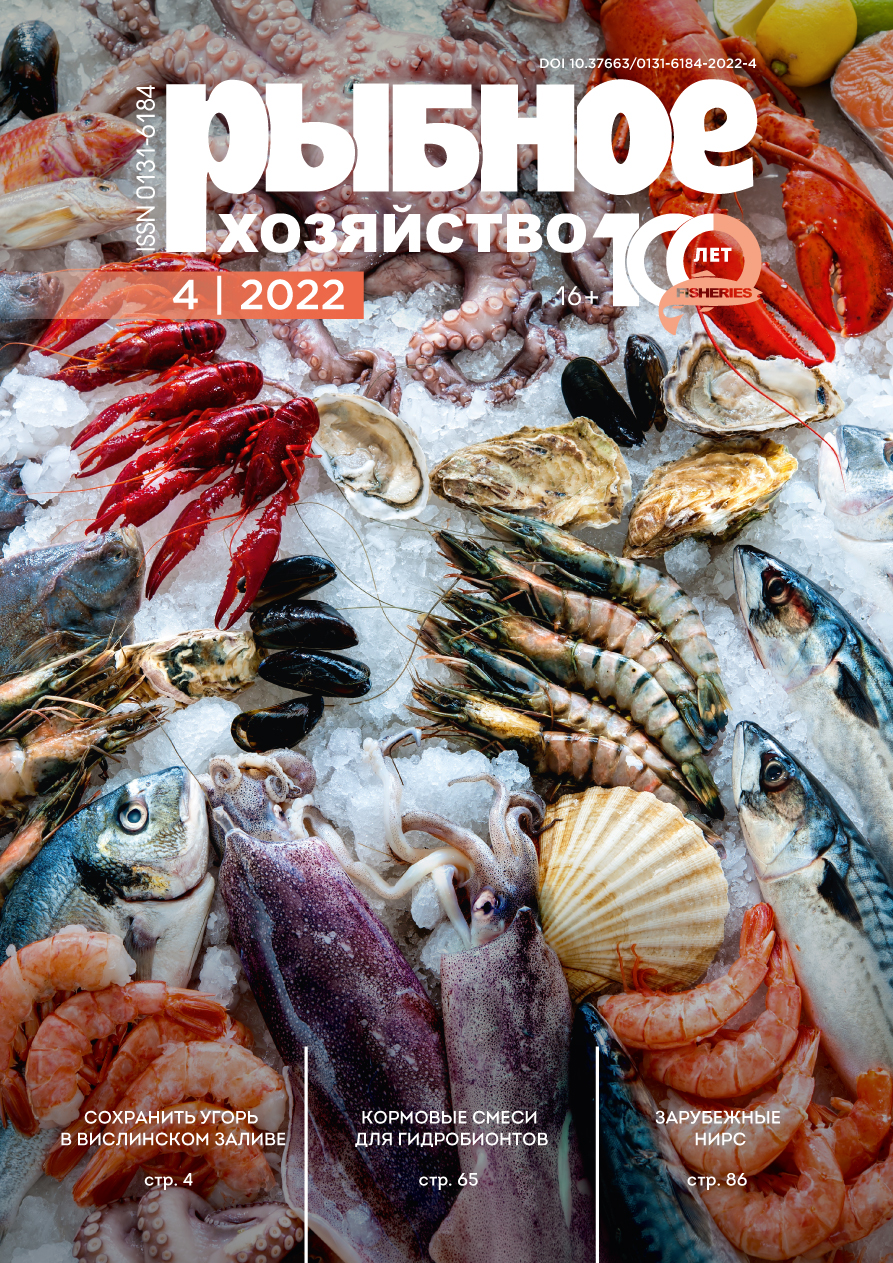Russian Federation
Russian Federation
Russian Federation
Moscow State University of Technologies and Management (FCU) (Leading Researcher)
UDK 639.3.09 Враги и болезни рыб
GRNTI 69.25 Аквакультура. Рыбоводство
OKSO 35.02.09 Ихтиология и рыбоводство
BBK 472 Рыбное хозяйство
In this paper, the genotoxicity of (1-(4-chlorophenyl)-3-(2,6-difluoro-benzoyl)urea) is investigated by a micronuclear test on Danio rerio, as a standard test object, at concentrations of 0.5, 1 and 2 mg/l. As a result of the work, a significant increase in the frequency of occurrence of micronuclei (0.73%) was found, while other nuclear anomalies in the maximum concentrations of erythrocytes were also significant. It was found that the frequency of micronuclei in concentrations of 0.5 and 1 mg/l on the fifth day of the experiment was the maximum, while at the maximum concentration (2 mg/l) the level of micronuclei was lower, which is probably due to toxic effects. An increase in the level of micronuclei may be associated with the genotoxic effect of DFB decay products. The genotoxicity results obtained using the micronucleus test method were contradictory. For this reason, it is necessary to conduct additional studies using the comet method or experiments on cell cultures.
diflubenzuron (DFB), pesticides, genotoxicity, micronuclear test, Danio rerio, erythrocytes, genotoxic effect of DFB decay products, comet method, experiments on cell cultures
1. Burka, J. F., Hammell, K. L., Horsberg, T. E., Johnson, G. R., Rainnie, D. J., & Speare, D. J. (1997). Drugs in salmonid aquaculture-a review. Journal of veterinary pharmacology and therapeutics, 20(5), 333-349.
2. World Health Organization. (2018). Dengue and Severe Dengue. Factsheet on dengue. Available in:. Accessed in: 25 May. 2021.
3. Benze, T. P., Sakuragui, M. M., de Paula Zago, L. H., & Fernandes, M. N. (2016). Subchronic exposure to diflubenzuron causes health disorders in neotropical freshwater fish, P rochilodus lineatus. Environmental toxicology, 31(5), 533-542.
4. Retnakaran, A., & Wright, J. E. (1987). Control of insect pests with benzoylphenyl ureas. In Chitin and benzoylphenyl ureas (pp. 205-282). Springer, Dordrecht.
5. Fischer, S. A., & Hall, L. W. (1992). Environmental concentrations and aquatic toxicity data on diflubenzuron (Dimilin). Critical reviews in toxicology, 22(1), 45-79.
6. Ivie, G. W., Bull, D. L., & Veech, J. A. (1980). Fate of diflubenzuron in water. Journal of Agricultural and Food chemistry, 28(2), 330-337.
7. Olsvik, P. A., Samuelsen, O. B., Erdal, A., Holmelid, B., & Lunestad, B. T. (2013). Toxicological assessment of the anti-salmon lice drug diflubenzuron on Atlantic cod Gadusmorhua. Diseases of Aquatic Organisms, 105, 27-43.
8. De Barros, A. L., Cavalheiro, G. F., de Souza, A. V. M., Traesel, G. K., Anselmo-Franci, J. A., Kassuya, C. A. L., & Cristina Arena, A. (2016). Subacute toxicity assessment of diflubenzuron, an insect growth regulator, in adult male rats. Environmental toxicology, 31(4), 407-414.
9. Schaefer, C. H., Dupras, E. F., Stewart, R. J., Davidson, L. W., & Colwell, A. E. (1979). The accumulation and elimination of diflubenzuron by fish. Bulletin of environmental contamination and toxicology, 21(1), 249-254.
10. Elhajouji, A., Lukamowicz, M., Cammerer, Z., & Kirsch-Volders, M. (2011). Potential thresholds for genotoxic effects by micronucleus scoring. Mutagenesis, 26(1), 199-204.
11. Bolognesi, C., & Hayashi, M. (2011). Micronucleus assay in aquatic animals. Mutagenesis, 26(1), 205-213.
12. Carrola, J., Santos, N., Rocha, M. J., Fontainhas-Fernandes, A., Pardal, M. A., Monteiro, R. A., & Rocha, E. (2014). Frequency of micronuclei and of other nuclear abnormalities in erythrocytes of the grey mullet from the Mondego, Douro and Ave estuaries-Portugal. Environmental science and pollution research, 21(9), 6057-6068.
13. Segner, H. (2009). Zebrafish (Danio rerio) as a model organism for investigating endocrine disruption. Comparative Biochemistry and Physiology Part C: Toxicology & Pharmacology, 149(2), 187-195.
14. Brand, M., Granato, M., & Nüsslein-Volhard, C. (2002). Keeping and raising zebrafish. Zebrafish: a practical approach, 7-37.
15. Abe, F. R., Machado, A. A., Coleone, A. C., da Cruz, C., & Machado-Neto, J. G. (2019). Toxicity of diflubenzuron and temephos on freshwater fishes: ecotoxicological assays with Oreochromis niloticus and Hyphessobrycon eques. Water, Air, & Soil Pollution, 230(3), 1-10.
16. Bagdonas, E., & Vosylienė, M. Z. (2006). A study of toxicity and genotoxicity of copper, zinc and their mixture to rainbow trout (Oncorhynchus mykiss). Biologija, (1).
17. Simakov, Y. G., Purtskhvanidze, V. A., Golovacheva, N. A., Bychkova, L. I., & Omelchuk, N. N. (2020). Stimulation of Erythropoeisis and Regenerative Processes in the Danio Rerio Fish Under the Influence of Interleukin-2. International Journal of Advanced Research in Engineering and Technology (IJARET), 11(5).
18. Prasad, I. (1970). Mutagenic effects of the herbicide 3′, 4′-dichloropropionanilide and its degradation products. Canadian journal of microbiology, 16(5), 369-372.
19. Brodeur, J. C., Malpel, S., Anglesio, A. B., Cristos, D., D'andrea, M. F., & Poliserpi, M. B. (2016). Toxicities of glyphosate-and cypermethrin-based pesticides are antagonic in the tenspotted livebearer fish (Cnesterodon decemmaculatus). Chemosphere, 155, 429-435.
20. Zaidi, N., Farine, J. P., & Soltani, N. (2013). Experimental study on diflubenzuron: degradation in freshwater and bioconcentration in mosquitofish following chronic exposure. Journal of Environmental Protection, 4(2), 188-194.
21. Soldatov, A. A. (2005). Peculiarities of organization and functioning of the fish red blood system. Journal of Evolutionary Biochemistry and Physiology, 41(3), 272-281.
22. Soldatov, A. A. (2005). Peculiarities of organization and functioning of the fish red blood system. Journal of Evolutionary Biochemistry and Physiology, 41(3), 272-281.
23. D’Costa, A. H., Shyama, S. K., Kumar, M. P., & Fernandes, T. M. (2018). Induction of DNA damage in the peripheral blood of zebrafish (Danio rerio) by an agricultural organophosphate pesticide, monocrotophos. International Aquatic Research, 10(3), 243-251.
24. Nwani, C. D., Nagpure, N. S., Kumar, R., Kushwaha, B., Kumar, P., & Lakra, W. S. (2011). Mutagenic and genotoxic assessment of atrazine-based herbicide to freshwater fish Channa punctatus (Bloch) using micronucleus test and single cell gel electrophoresis. Environmental toxicology and pharmacology, 31(2), 314-322.
25. Ahmad, I., & Ahmad, M. (2016). Fresh water fish, Channa punctatus, as a model for pendimethalin genotoxicity testing: A new approach toward aquatic environmental contaminants. Environmental toxicology, 31(11), 1520-1529.
26. Ayllon, F., & Garcia-Vazquez, E. (2000). Induction of micronuclei and other nuclear abnormalities in European minnow Phoxinus phoxinus and mollie Poecilia latipinna: an assessment of the fish micronucleus test. Mutation Research/Genetic Toxicology and Environmental Mutagenesis, 467(2), 177-186.
27. Simakov, Yuri Georgievich, Violetta Aleksandrovna Purtskhvanidze, Nadezhda Nikolaevna Omelchuk, Larisa Ivanovna Bychkova, and Natalia Alekseevna Golovacheva. “Testing the Effect of Nutrients for The Personalized Nutrition with The Danio Rerio Fish (On the Example of The Nanodessert Nutritional Fermented Dairy Product).” International Journal of Engineering Trends and Technology 68, no. 7 (July 25, 2020): 13-18. doihttps://doi.org/10.14445/22315381/ijett-v68i7p203s.
28. Fanta E. et al. Histopathology of the fish Corydoras paleatus contaminated with sublethal levels of organophosphorus in water and food //Ecotoxicology and environmental safety. - 2003. - T. 54. - №. 2. - S. 119-130.
29. De Souza J. P. et al. Acute toxicity and environmental risk of diflubenzuron to Daphnia magna, Poecilia reticulata and Lemna minor in the absence and presence of sediment //Pesticidas: revista de ecotoxicologia e meio ambiente. - 2011. - T. 21.











